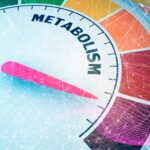The causes of gut symptoms during eating disorder recovery and how to reduce them
The relationship between our eating habits and our gut health is incredibly strong. This is particularly noticeable for many of our clients in the early stages of recovery from an eating disorder.
Research has found that up to 98% of people with an ED also have at least one functional gut disorder.1 We delve more deeply into the science behind this here but essentially, there are both physiological and psychological reasons as to why gut health is so deeply affected by the presence of an eating disorder.
Many of our clients report experiencing bloating, reflux, pain and more when they begin the process of recovery. In this article, we’ll talk you through why you’re experiencing all these symptoms and how to ease them.
How does starvation functionally effect the gut?
Arguably the most significant cause of gastrointestinal (GI) issues in those recovering from an eating disorder is simply a lack of food.
Not only does is the underuse of the gut an issue (we’ll get to that in a minute!) but the actual structure of the GI tract is often affected by starvation. Prolonged restriction leads to the muscular atrophy of gut – in other words, the muscles in the GI tract are broken down by the body to be used for energy in the absence of food. This damage can be reversed as you begin to renourish your body.
In terms of underuse, the two major outcomes are gastroparesis and constipation.
Gastroparesis is a medical term that describes delayed gastric emptying. Essentially, when the body is experiencing starvation, the contractions of the stomach muscles that push food along slow down in order to conserve energy.
To put this into context, healthy digestion takes about 1-2 hours, whereas someone with a restrictive eating disorder may take 5-10 hours to digest the same meal. As you can probably imagine, having food sitting in your stomach for long periods of time can lead to some unpleasant symptoms like gas, bloating, distention and pain, as well as feeling full for a long time after eating.
Thankfully, research has shown that the rate of gastric emptying improves with weight restoration.2 So keep eating! As your body relearns how to function, this discomfort will pass.
Chronic constipation is also common in eating disorder recovery, as the bowel requires a minimum amount of waste in order to empty.3 It makes sense when you think about it – if there’s not much going in, there will also be not much coming out! Likewise, as the body conserves energy as a form of self-protection, it’s not unusual to be constipated at the beginning of the recovery journey.
As with gastroparesis, this will improve as you continue to renourish yourself. Additionally, you are probably aware that fibre is good for the gut – however, make sure you increase fibre-rich foods gradually, as too much too soon can increase gas and bloating.
How does disordered eating effect the secretion of digestive enzymes?
The role of digestive enzymes is to break down macronutrients (carbohydrates, protein and fat) into smaller molecules that can be absorbed by the body. Eating disorder behaviours can affect their secretion in various ways, which can, in turn, disrupt digestion.
When the body is experiencing starvation, fewer digestive enzymes are produced as a result of disrupted functioning of the GI organs. This leads to food moving along the GI tract without being adequately broken down, causing bloating, gas and diarrhoea. If you continue to nourish yourself with small, frequent meals, the production of digestive enzymes will usually resume on its own.
Conversely, in the case of binge eating, when large amounts of food rapidly enter the small bowel, an influx of digestive enzymes are released. This speeds up colonic motility (movement of waste through the large intestine), leading to diarrhoea and urgency. As you continue to reduce your episodes of binge eating, these symptoms will typically disappear.
How do stress hormones effect gut function?
It will come as no surprise that an eating disorder causes a chronic stress response within the body. As part of this ‘fight or flight’ response, digestion slows as the body’s energy and resources are directed towards functions that are imperative for survival.
There are some simple ways to reduce stress, such as deep breathing and meditation practices. Additionally, research has shown that gut-directed hypnotherapy can be as effective as elimination diets in managing gut symptoms.4 The mind is an incredibly powerful thing!
How do eating disorder behaviours effect the function of stomach acid?
Hydrochloric acid, or stomach acid, plays a key role in digestion by helping to break down, digest and absorb nutrients from food. However, it can also be involved in malfunctions of the GI tract that result in painful symptoms.
A major cause of issues with stomach acid is self-induced vomiting. When vomiting is frequent, the valve between the stomach and the oesophagus becomes weakened. This valve, known as the oesophageal sphincter, is designed to prevent the backflow of contents from the stomach. When it malfunctions, stomach acid is able to travel up into the oesophagus, causing heartburn, reflux and oesophageal damage.3
While this impairment of the oesophageal sphincter may or may not be reversible (depending on the extent of the damage), there are some strategies you can implement to manage the symptoms. These include refraining from lying down for 30 minutes after eating or drinking, leaving a gap between eating and exercising, and eating slowly.
What we hope to convey in this article is that the simplest solution to your gut issues is typically to trust the recovery process. Since many of these issues are caused by starvation and malnutrition, the most obvious fix is to renourish your body. While it may seem counterintuitive to continue to eat when food is causing these symptoms, it is exactly what you need to do in order for your body to repair the damage and allow your gut to function normally.
Although elimination diets can be helpful for improving gut symptoms in some cases, they are not typically recommended for people with a past or present eating disorder. Restriction of any kind can worsen or reignite eating disorder behaviours, which pose a major risk to your health and wellbeing.
As you can probably tell, the connection between eating disorders and gut function is complex. If your gut symptoms are not improving with recovery, or if you simply want more support, reach out to our expert dietitians at [email protected] to find out how we can help.
Karli Battaglia MDiet, APD
EHL Team x
References
- Boyd C, Abraham S, Kellow J. Psychological features are important predictors of functional gastrointestinal disorders in patients with eating disorders. Scandinavian Journal of Gastroenterology. 2005;40(8):929-935.
- Bluemel S, Menne D, Milos G, Goetze O, Fried M, Schwizer W et al. Relationship of body weight with gastrointestinal motor and sensory function: studies in anorexia nervosa and obesity. BMC Gastroenterology. 2017;17(1).
- Santonicola A, Gagliardi M, Guarino M, Siniscalchi M, Ciacci C, Iovino P. Eating Disorders and Gastrointestinal Diseases. Nutrients. 2019;11(12):3038.
- Peters S, Yao C, Philpott H, Yelland G, Muir J, Gibson P. Randomised clinical trial: the efficacy of gut-directed hypnotherapy is similar to that of the low FODMAP diet for the treatment of irritable bowel syndrome. Alimentary Pharmacology & Therapeutics. 2016;44(5):447-459.














